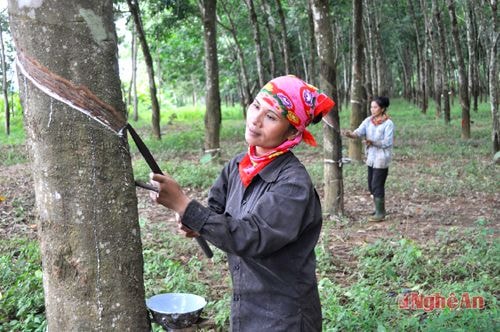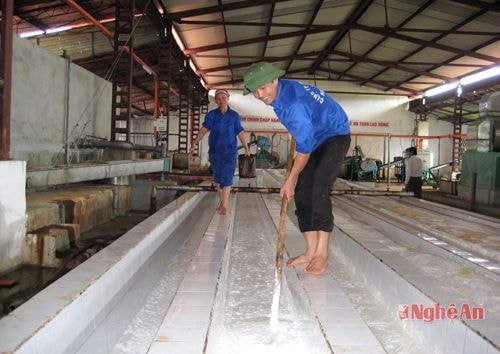"Exit" for high-value agricultural products
(Baonghean) - The falling prices of agricultural products, especially valuable agricultural products such as coffee, rubber, sugar, etc., are a challenge for domestic producers in general and in Nghe An in particular. Uncertainty in the export market, low-yield raw material areas, in addition to insufficient quantity and uncompetitive quality of goods are the reasons why factories are facing difficulties.
Fear of falling prices
Thai Hoa Rubber Coffee Company Limited has 2,600 hectares of rubber and 200 hectares of coffee. If in 2010 and 2011, each ton of rubber products cost up to 90 - 100 million VND, now it is only 30 million VND. In 2011, the company purchased rubber latex at 23,000 VND/kg, now it is only 6,400 VND/kg. Similarly, the price of 1 kg of fresh coffee has decreased from 8,000 VND to only 3,000 VND. In the "prosperous" years, 1 hectare of rubber brought a net profit of up to 150 million VND, but now, only intensive farming areas can reach 30 million VND/ha/year, while coffee reaches 50 million VND/ha.
The reason for this situation, according to Mr. Tran Duc Tien, Deputy General Director of the Company and Director of Tay Hieu 1 Farm, is that the product consumption depends entirely on the market. If in the past, the products were mainly exported to the US, in recent years, due to the area of crops being about to degenerate and needing to be liquidated and replanted, they are mainly exported to China through unofficial channels. It is because of the unstable market and uncompetitive products that they are gradually losing their position in the market.
 |
| Harvesting rubber latex at Tay Hieu 2 Farm - Nghia Dan. Photo: HV |
The same goes for sugarcane, currently the sugar price is low, the wholesale price is 12,000 VND/kg, the highest point is 15,000 VND/kg. In recent years, the domestic and world economic situation has fluctuated a lot, the prices of all kinds of input materials and goods for production have increased, in which the sugar market is low, difficult consumption has led to low sugarcane prices, so farmers are no longer interested in sugarcane. In addition, pests and diseases are threatening these plants. The Sugarcane Association explains that there are many reasons why Vietnam's sugar price is higher than other countries, but mainly in the raw material stage. In Thailand, the price of sugarcane for processing is only 30 - 35 USD/ton. Sugarcane cost in sugar processing cost is only 300 - 350 USD/ton (equivalent to 6,000 - 7,000 VND/kg of sugar), while in Vietnam, sugarcane cost accounts for 8,000 - 10,000 VND/kg of sugar, a difference of 2,000 - 4,000 VND/kg of sugar. This difference is due to agricultural factors, both mechanisms and policies, which cannot be resolved overnight.
Business efforts
Mr. Tran Duc Tien, Deputy General Director of Thai Hoa Rubber Coffee Company, shared: In the coming time, to stand firm, we advocate continuing to plan the planting of high-yield coffee varieties, applying production in the direction of developing high-tech agriculture and innovating processing technology to meet export quality requirements and market tastes; joint ventures and cooperation with reputable domestic and foreign enterprises to build factories to produce and process ground coffee, increasing the value of agricultural products. At the same time, build product brands, actively participate in fairs and exhibitions to introduce and promote products; promote traditional markets, increase search and expand domestic and foreign markets to export products to new markets.
For Song Con Sugarcane Factory (Tan Ky), there are solutions to increase competitiveness, expand the area of raw material cultivation and invest in technological innovation, ensuring competitiveness. Currently, the Company has contributed capital to establish a 2-member LLC for the Youth Volunteer Team 4 - Song Con with a total charter capital of 20 billion VND. Of which, the capital contribution of Song Con Sugarcane Company is 14.2 billion VND, accounting for 71% of the charter capital, the rest is the State capital of the Youth Volunteer Team 4. In the coming time, the Company also plans to cooperate with An Ngai Agricultural LLC to invest capital and increase the capacity of this company. The two parties have agreed in writing to contribute capital. In addition, the Company is also building sugarcane seed farms to propagate new sugarcane varieties to supply the raw material area to replace all old, degraded varieties. The Company has propagated 14 varieties and is evaluating and selecting suitable varieties for replication in the area. The company is also considering diversifying its business activities, such as preparing to build a commercial center in Vinh City. At the same time, the company is planning to invest in expanding the capacity of its sugar processing plant from 3,300 tons of sugarcane per day to 5,000 tons of sugarcane per day to keep up with the schedule.
 |
| Rubber processing at Song Con Agricultural Company Limited. Photo: Chau Lan |
As for Xuan Thanh One Member Co., Ltd., the application of science and technology is especially focused on by the company. In addition to 142 hectares of sugarcane and 491 hectares of rubber, the unit has introduced many quality orange and tangerine varieties that have been tested and transferred by the company in coordination with the Vietnam Agricultural Genetics Institute, and then mass-produced on a large scale. Up to now, Xuan Thanh One Member Co., Ltd. has 142 hectares of sugarcane, 491 hectares of rubber, 725 hectares of oranges, of which 100 hectares of V2 oranges ripen during Tet, 50 hectares of early-ripening BH oranges, 60 hectares of Xa Doai oranges, more than 60 hectares of PQ tangerines and is testing Quang Tien pink grapefruit and Ha Giang red grapefruit varieties... Introducing orange and tangerine varieties that ripen evenly throughout the year significantly increases the value of the goods. In addition, investing in insect-proof net houses is also a solution to protect pests from disease-free seed gardens. Thanks to that, the company and producers have high profits. Xa Doai oranges are sold at 40,000 VND/kg, PQ tangerines are 25,000 VND/kg, the market is quite open. But when the Japanese organization JICA came to survey, they warned: Why is the price of Nghe An oranges high, while oranges in Japan are produced very cleanly and are also of good quality but converted into Vietnamese currency, it is only equivalent to 20,000 VND/kg.
"Way out"
To increase the value of agricultural products of Vietnam in general and Nghe An in particular in the context of integration, there is no other solution than to need to intensify the raw material area to increase productivity, output and land use value. Sugarcane growers can only make a profit when the sugarcane yield reaches 80 tons/ha or more, tea growers also need to invest in intensive farming and apply advanced scientific and technological measures to increase tea yield to 13 - 15 tons/ha, at the same time it must be clean tea, ensuring food safety. As for orange growers, they need to recalculate market demand to avoid massive expansion of acreage as is currently the case when the geographical indication of Vinh oranges does not reach that, avoiding the situation of fake Vinh oranges. With quality coffee, it is necessary to promote intensive farming with good varieties, because the market is attractive while the acreage is reduced (currently only 200 hectares). For exports, the aim is to process finely to increase product value. Currently, Nghe An's export products such as rubber, tea, coffee, etc. are mainly raw exports to easy-going markets, with low prices and low profits. Currently, Nghe An's raw tea exported to other countries is less than 15,000 VND/kg (tea type). If businesses want to export well, they must first ensure superior product quality. In addition, factories need to "go together" with producers, closely follow raw material areas and have solutions to take care of raw material areas - the vital factor of factories. Aiming for the goal of farmers contributing shares to factories to connect, share benefits and responsibilities, and develop together.
Phu Huong - Chau Lan






